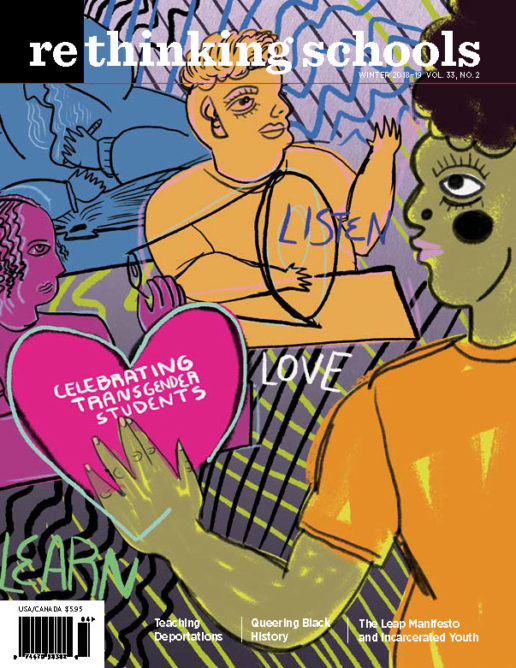Our picks for books, videos, websites, and other social justice education resources 33.2
Curriculum
Six by Ten: Stories from Solitary
Edited by Taylor Pendergrass
and Mateo Hoke
(Haymarket Books, 2018)
282 pp.
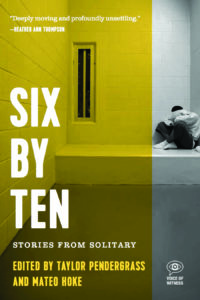
This volume is the latest from Voices of Witness, a nonprofit seeking to amplify “unheard voices” through oral history. Six by Ten offers 13 stories of solitary confinement from prisoners, former prisoners, their families, and prison workers. These histories confirm that solitary confinement is torture, but also explain its place in the larger dehumanization that is everyday prison life. These narratives of solitary are themselves acts of resistance. They are assertions of survival and agency, a challenge to the attempt to silence, isolate, and “break” those the state deems most incorrigible. The book’s appendixes offer teacher-friendly background materials and resources for those looking to problematize solitary confinement with their students.
***
Marked, Unmarked, Remembered:
A Geography of American Memory
By Andrew Lichtenstein and
Alex Lichtenstein
(West Virginia University Press, 2017)
181 pp.
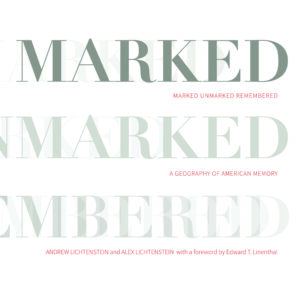
In William Faulkner’s famous passage from Requiem for a Nun, “The past is never dead. It’s not even past.” There may be no more imaginative illustration of this insight than the Lichtensteins’ Marked, Unmarked, Remembered. Through stark black-and-white photographs paired with short passages and historical essays, the authors take us through a people’s history of the United States. The photos and text alert us to historical episodes of resistance and tragedy — some famous, some buried Ñ and what the sites of these events look like today. The book’s concluding “Remembered” section shows how moments in U.S. history are commemorated in our own time — the poignant, like the depiction of someone chalking on the sidewalk the names of those who perished in the 1911 Triangle Shirtwaist Factory Fire in New York City; and the infuriating, like the three Confederate Civil War reenactors celebrating the 150th anniversary of Jefferson Davis’ inauguration. The book is rich in teaching possibilities.
Poetry
Whereas
By Layli Long Soldier
(Graywolf Press, 2017)
101 pp.
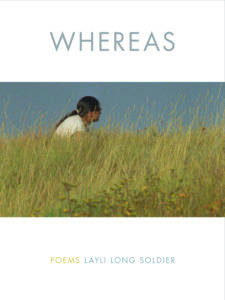
This collection of poems by Layli Long Soldier is a response to the congressional resolution of apology to Native Americans signed by Obama in 2009. Soldier explains, “My response is directed to the apology’s delivery, as well as the language, crafting, and arrangement of the written document. I am a citizen of the United States and . . . a citizen of the Oglala Lakota Nation — and in this dual citizenship, I must work, I must eat, I must art, I must mother, I must friend, I must listen, I must observe, constantly I must live.” Soldier’s poems are a gorgeous rebuke of the language of colonialism — the (broken) treaties, the (genocidal) legislation, and the (empty) apologies. Teachers will find many uses for these poems, including as models for student writing or by pairing with government documents — the “good faith” clause of the Northwest Ordinance, the Indian Removal Act, the Dawes Act, or any number of U.S. treaties with the sovereign nations on whose land most of us currently teach.
Young Adult Fiction
Black Enough: Stories of Being Young and Black in America
Edited by Ibi Zoboi
(Balzer & Bray, 2019)
416 pp.
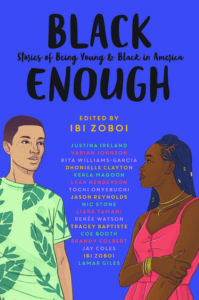
Ibi Zoboi, a Haitian immigrant whose novel American Street was a finalist for the National Book Award, has gathered a bouquet of Black voices in her anthology, Black Enough: Stories of Being Young and Black in America. Zoboi’s collection features 17 of the most acclaimed Black authors writing for teens today — Renée Watson, Jason Reynolds, Rita Williams Garcia, and Tracey Baptiste, to name a few. The stories’ Black characters come from diverse experiences — city and rural landscapes, gay and lesbian, biracial, immigrant, rich and poor. Each story explores an aching or familiar moment in teen life — a crush, a kiss, a family torn apart, sexual harassment, self-discovery. This collection of stories is an essential book for any teacher wanting stories about what it’s like to be young and Black in the United States today. Age 13+.
***
Watch Us Rise
By Renée Watson and Ellen Hagan
(Bloomsbury, 2019)
400 pp.
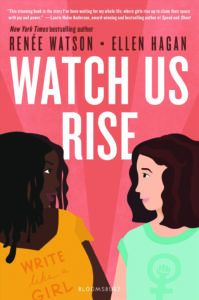
Newbery Honor and Coretta Scott King Award-winning author Renée Watson teams up with poet Ellen Hagan in this YA feminist anthem about young women finding and raising their voices. This two-voice novel told from the perspective of high school juniors — Jasmine, who is Black, and Chelsea, who is white — is a must read for middle and high school students. These best friends and their cohort seek to interrupt the sexism, sexual harassment, and patriarchy at their progressive New York City high school. The novel is compelling, full of the drama of high school — crushes, family heartaches, hypocritical administrators, teachers, and peers. But the novel is also full of hope and strategies for tackling the problems that women face in schools, on the bus, in stores, and society. These dynamic young women write blogs and poetry, they use guerrilla tactics to wake up the school to the myriad ways that they have been silenced and shamed because of their looks, their size, their gender. The book teaches about women artists who tackle these issues, who have spoken up and refused to be silent in the face of oppression. Watch Us Rise is a gift to teachers who want a book that seeks to explore and explode this #MeToo time in our schools. Ages 13+.
Picture Books
Missing Daddy
By Mariame Kaba
Illustrated by bria royal
(Project NIA, 2018)
32 pp.
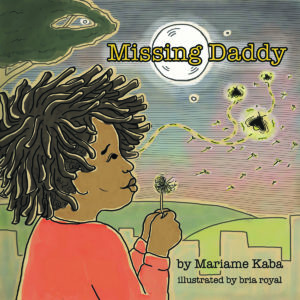
In the last decade, the representation of family diversity has improved in children’s books, including single parents, children living with grandparents, two moms, and two dads. However, there are only a handful of books reflecting the reality of the 2.7 million children under the age of 18 in the United States with an incarcerated parent. That’s why author and activist Mariame Kaba wrote and published Missing Daddy about a young girl whose father went to prison when she was 3. The young girl shares with the reader how much she holds on to her father’s words, how she gets teased in school, and the fact that her mother has to work two jobs to make ends meet. This easy-to-read picture book with beautiful illustrations ends with a warm scene of the young girl and her father in the visiting room. We recommend this book for every early childhood classroom. For too long, despite growing mass incarceration, prisoners have been an invisible population in our school curriculum.
***
Someday Is Now: Clara Luper and the 1958 Oklahoma City Sit-Ins
By Olugbemisola Rhuday-Perkovich
Illustrated by Jade Johnson
(Quarto Publishing Group, 2018)
32 pp.
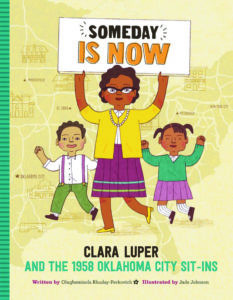
Introduce students to the activism of Clara Luper, an African American high school teacher who organized lunch counter sit-ins for her students to protest segregation in 1958. The narrative functions as a history lesson and as a guide for when and how to challenge injustice (now and with nonviolent direct action). The author does not shy away from describing the humiliating abuse the children suffered during the sit-in. The artist shows images of Black children covered in food while white patrons yell, throw, and shake their fists. The art is simple but stunning.
Policy/Activism
Lift Us Up, Don’t Push Us Out! Voices from the Front Lines of the Educational Justice Movement
By Mark R. Warren with David Goodman
(Beacon Press, 2018)
185 pp.
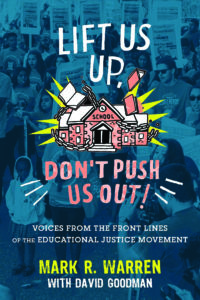
The premise of this impressive collection by a diverse array of education activists is that those most affected by interlocking forms of oppression — students of color and their parents — must lead the educational justice movement. That is why the opening five chapters of Lift Us Up, Don’t Push Us Out! give us the voices of students like Carlos Rojas and Glorya Wornum, opponents of racist discipline policies in Boston schools, and parents like Zakiya Sankara-Jabar, who shares her struggle to find a school that will love and care for her elementary-aged Black son who has already, by kindergarten, been identified as a troublemaker. The anthology also includes essays by teachers, union and community organizers, and activist scholars. All contributions are written as first-person narratives, giving this collection the feel of shared knowledge toward movement building, rather than a polemic with one-size-fits-all answers.

